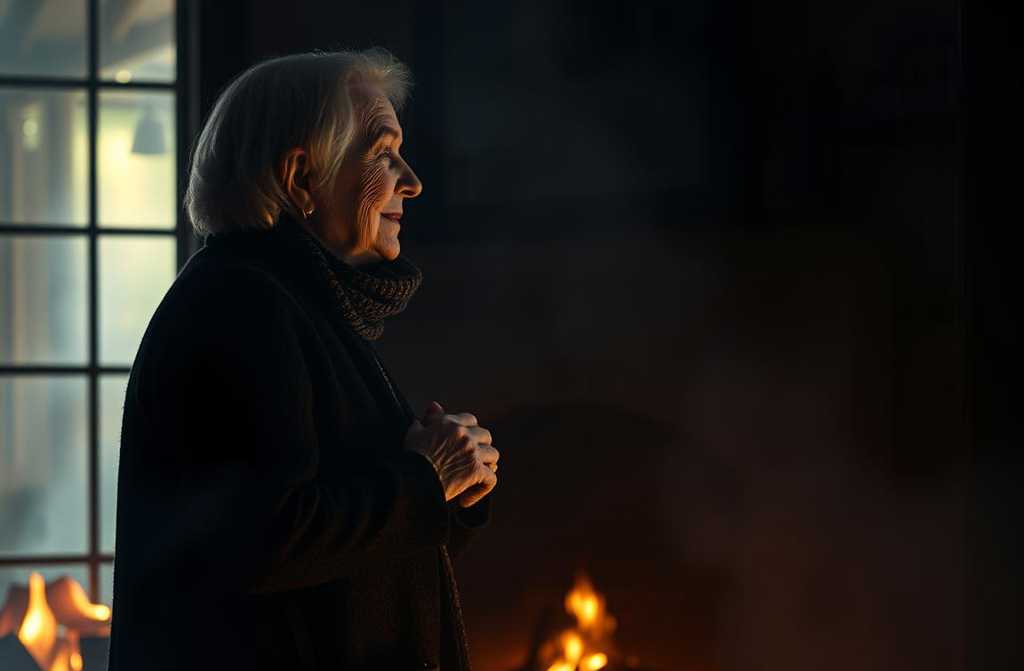The grandfather clock in the hall chimed three times, but the sound was swallowed by the thick, milky fog that clung to the house from every side. It sprawled across the garden, tangled in the branches of the apple trees, slid down the slate roof, and seeped through the cracks in the windows, turning the world beyond the glass into a wavering illusion. The wind seemed to avoid this place, as if sensing it was not meant to linger. Only the occasional dry creak of the shutters disturbed the heavy silence, a reminder that the house still lived, still breathed.
Eleanor sat by the fireplace, clutching a cup of cold tea, her fingers trembling slightlywhether from the chill or anticipation, she couldnt say. Her gaze never left the door, as if she could will the moment closer. She knew he would come tonight.
Not because of any promise. Not because of letters or calls. She just knewthe same way you know snow will fall when the air turns crisp, the stars burn too brightly, and the silence presses in like a weight.
The house was old, always creakingfloorboards, beams, window framesbut tonight the sounds were different. Slow, deliberate, like cautious footsteps pacing just beyond the walls, pausing now and then to listen. Eleanor tried to convince herself it was just her imagination, but each creak brought him closerthe one she both waited for and feared.
Three years ago, this house had been full of life. Laughter, arguments, slamming doors, the whistle of the kettle drowning out the radio someone always played too loud. The smell of fresh bread and pipe smoke lingered in the halls, a football thudded in the garden, and spoons clattered in the kitchen. Then, one by one, they all left. Some moved away. Some died. Silence seeped into every room, soaked into the walls, the floors, the old photographs. Only Eleanor remained. And the memories, heavy or warm, with nowhere else to go.
Eleanor closed her eyes and heard his voice againlow, rough, as if carried from a distance. “I’ll return,” hed said. “But dont wait for me by day.” When shed asked why, hed tilted his head, smiled faintly, and replied, “Because by day, I wont be here.”
A knock. One sharp rap, testing. Then anotherlouder, insistent. Silence followed, thick enough to hear her own heartbeat. Eleanor rose, set the cup on the mantel, stared at the dying embers, and moved toward the door. Each step made the floorboards groan. The handle was icy, dampas if someone had touched it before her. She turned it with effort.
A man stood on the threshold. A grey overcoat, water beading on the shoulders like hed walked through rain or fog. His face was hidden under the brim of his hat, but his lips were visiblepale, tinged with blue, unsmiling.
“You came,” Eleanor said, her voice quieter than she intended.
He nodded and stepped inside, bringing the chill with him. He didnt remove his hat, didnt wipe his shoesas if his very presence pushed the walls back, thickened the air.
“I knew youd wait,” he murmured, each word settling into the quiet. “You always do.”
Eleanor didnt answer. Her eyes dropped to his handslong, slender, skin too pale for someone whod seen the sun. His fingers were still, but their stillness was unsettling, as if they remembered gripping her shoulders hard enough to leave bruises.
“Why are you here?” she finally asked, hating how her voice wavered.
“You already know.”
He stepped forward, the floorboards groaning under his weight. The fire flared without added wood. Shadows stretched along the walls, and for a moment, Eleanor swore she heard whisperssoft, nearly silentbehind them.
“I thought Id have more time,” she said quietly, refusing to look away.
“Theres never enough,” he replied, neither gentle nor cruel. Just truth.
They sat by the fire for what felt like hours, the flames flickering in his dark, unmoving eyes. He spoke of places without light, where the only sound was water lappingsoothing, he said, more than any silence. Of those hed taken, and those whod gone willingly, as if sensing his approach. Sometimes he paused, and in those moments, Eleanor heard only the crackling logs and the unseen tide of fog outside.
His voice was calm, unhurried, and she realized she wasnt afraid. If anything, she wanted to hear morelike a story whose ending was inevitable.
“Are you ready?” he asked, leaning slightly forward.
Eleanor looked around. The cup on the mantel, the armchair with its sunken cushion, the photograph in its tarnished silver frame. Everything was just as it had been three years ago, as if time had stopped inside these walls. Only she had changed.
“Yes,” she said, her voice steady.
He stood, offered his hand. She took it. Cold as ice, but not bitingcomforting, almost, as if fear could be left behind by the fire.
When morning came and no smoke rose from the chimney, the villagers assumed Eleanor had gone away. The door was locked, the windows shuttered, the silence inside absolute. The last embers in the fireplace had burned to ash, still faintly warm.
Only two cups remained on the tableone empty, a faint lipstick mark on the rim, the other half-full, a wisp of steam still curling above it.






